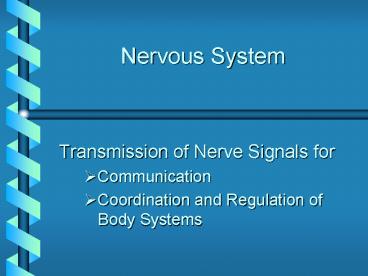Nervous System - PowerPoint PPT Presentation
1 / 21
Title:
Nervous System
Description:
Nervous System. Transmission of Nerve Signals for. Communication. Coordination and Regulation of ... Autonomic Nervous System (involuntary) Sympathetic ... – PowerPoint PPT presentation
Number of Views:23
Avg rating:3.0/5.0
Title: Nervous System
1
Nervous System
- Transmission of Nerve Signals for
- Communication
- Coordination and Regulation of Body Systems
2
Structure of a Neuron
Dendrites(receive signals)
Cell Body(maintains cell metabolism)
Myelin Sheath(insulator)
Axon bulb
Axon(conducts signals)
Dendrite of anotherneuron
Axon of anotherneuron
3
Types of Neurons
4
(No Transcript)
5
Transmission of Nerve Impulse Along a Neuron
- Involves a change in charge across the neurons
membrane, caused by the movement of ions - Action Potential rapid depolarization and
repolarizationof membrane
6
Electrical Events During AnAction Potential
Action Potential
Extracellular Fluid(uncharged)
2
depolarization
Threshold
RestingPotential
3
repolarization
1
EPSP
polarized
IPSP
7
Resting Potential Depends on Ionic Gradients
Net negative charge inside neuron
Inside
- Potassium ionsare pumped intocell
Na
Na
Cl-
- Large organic moleculescannot pass through
membrane
Na
Cl-
Org-
K
Org-
K
Org-
K
Org-
Org-
Org-
Na
K
K
Cl-
Cl-
Outside
K
Org-
Org-
- Sodium ions arepumped out
Na
Na
Cl-
Org-
- Chloride ionsfound in extra-cellular fluid
Cl-
K
8
Resting Potential
9
Action Potential
2. Potassium flows out of neuron through open
channel, causing repolarization
1. Sodium flows into neuron through open channel,
causing depolarization
inside
inside
outside
outside
10
Propagation of an Action Potential Along an Axon
11
Transmission of Nerve Impulses Between Neurons
- Signal is carried by neurotransmitters that
diffuse across the space between neurons - Synapse junction between neurons
- Synaptic cleft space between neurons
- Neurotransmitters bind to receptors on next
neuron, opening ion channels
12
Structure and Operationof the Synapse
1 Actionpotential isinitiated
2 Action potentialreaches axon bulb
Pre-synaptic cell
3 Synaptic vesiclesreleaseneurotransmitter
5 Action Potential can be triggered in
post-synaptic cell
4 Neurotransmitter binds to receptor and opens
ion channel
Post-synaptic cell
13
Transmission Between Neurons
- Neurotransmitters can be
- Stimulatory initiate action potential
- Acetylcholine
- Inhibitory prevent action potential
- Dopamine
- After acting on the post-synaptic neuron,
neurotransmitters are removed from the synaptic
cleft - Acetylcholinesterase breaks down acetylcholine
14
Neurotransmitters carry signals to muscle cells
to stimulate contraction.
15
Applying Your Knowledge
- Potassium Ions (K)
- Neurotransmitters
- Sodium Ions (Na)
- Which one is responsible for
- Transmission of a nerve impulse across a synapse?
- Depolarization of a neurons membrane?
- Transmission of a nerve impulse along an axon?
- Repolarization of a neurons membrane?
16
Nervous System Organization
Central Nervous System
Peripheral Nervous System
17
Parts of the Brain
Cortex thinking, learning, memory, speech
movement, senses
musclecoordination
18
Spinal Cord and Reflex Arcs
19
Autonomic Nervous System
20
Applying Your Knowledge
- Central Nervous System
- Somatic Nervous System
- Autonomic Nervous System
- Which one
- Is responsible for increasing breathing rate when
you start running? - Includes the spinal cord?
- Controls skeletal muscle movement?
21
Nervous System Disorders
- Alzheimer Disease gradual loss of neural
function due to tangles and plaques associated
with axons - Parkinson Disease deficiency of dopamine causes
tremors, rigidity, shuffling gait - Huntington Disease uncoordinated movements and
degenerative neurological symptoms beginning at
middle age, due to autosomal dominant inheritance































